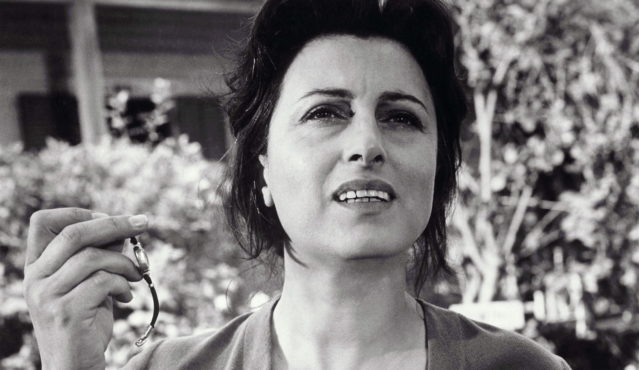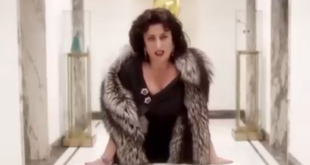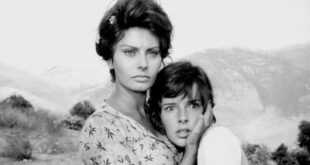Beginning today, the Film Society of Lincoln Center along with Istituto Luce Cinecittà will honor the distinguished career of Italian cinema icon Anna Magnani. “La Magnani,” an all-celluloid retrospective, will feature 24 works shown on 35mm or 16mm film. The series will take place at Lincoln Center in New York City, May 18 – June 1 leading right up to the much anticipated “Open Roads: New Italian Cinema.”
Born in Rome in 1908, Anna Magnani became a highly respected Academy Award winning actress, but her beginnings were anything but glamorous. Magnani grew up in poverty. She was raised by her grandmother after her mother left at a young age, and she never knew her father. It was clear before long that Magnani was a natural born performer. She worked her way through Rome’s Academy of Dramatic Art by singing in local clubs around Rome and its countryside. Her first role was in a 1920’s silent film, but Vittorio De Sica’s 1941 film, “Teresa Venerdì” was the first to earn her critical acclaim. Four years later came her breakout role in Roberto Rossellini’s 1945 classic, “Rome, Open City”. The movie broke new ground, being the first work of the neorealistic era of filmmaking and put Anna Magnani on international radar and paved the way for a prolific career in film that would last right up until the end of her life in 1973.
Magnani won an Academy Award in 1955 for her role as Serafina Delle Rose played opposite Burt Lancaster in Tennessee Williams’ screen version of “The Rose Tattoo,” which will be shown in the series. Magnani was known for her realistic portraits of salt of the earth characters who faced hard economic and social times in a post-war world. She gave strong, passionate personalities to each character that she portrayed and made each one come alive and light up the screen through her vast talent and empathy. Although she is considered cinema royalty, she was never one to embrace the lifestyle of a movie star. She is quoted as saying, “I hate respectability. Give me the life of the streets, of common people.” There is no doubt, however, that she was indeed respected not only by her fans and critics, but by her peers as well.
Below are the films included in the retrospective. Click here for the complete schedule.
1870
Alfredo Giannetti
1972
Magnani was cast alongside legendary leading man Marcello Mastroianni for the only time in this stirring historical drama. They play a husband and wife caught up in the political upheaval of the Risorgimento era. With a score by Ennio Morricone.
L’amore
Roberto Rossellini
1948
Roberto Rossellini’s twin tribute to Magnani offers a one-two punch of tour-de-force performances from the actress: in the first part adapted from a theatrical monologue by Jean Cocteau, she is a jilted lover hanging desperately on the telephone line; in the second part, a story by Federico Fellini, she is a peasant who may or may not have experienced a miracle.
…And the Wild Women
Renato Castellani
1959
Sparks fly as Magnani plays opposite another legend of Italian cinema—Giulietta Masina—in this explosive women-in-prison drama. Masina is the naïve young innocent wrongly convicted, Magnani the volatile hardened convict who corrupts her. Each woman gets ample opportunity to shine, but the best moment belongs to the electrifying Magnani. The sight of her shimmying down a cellblock while shouting “rock and roll!” is worth the price of admission alone.
Angelina
Luigi Zampa
1947
In this rousing, up-with-the-people slice of neorealism, Magnani delivers a powerhouse performance as a slum-dwelling mother of five who leads a band of women in a female-powered political revolution.
The Bandit
Alberto Lattuada
1946
Magnani is a fierce femme fatale who ensnares an ex-POW in her crime ring in this shadowy, fatalistic neorealist noir. Director Alberto Lattuada imbues this socially conscious crime saga with a shadowy style and a foreboding fatalism. Memorable set piece: a nightclub robbery played against a drum solo.
Bellissima
Luchino Visconti
1952
This early gem from melodrama maestro Luchino Visconti deftly blends cynical showbiz satire with heart-tugging pathos. Magnani is the delusional Roman stage mother obsessed with making her daughter a movie star.
Doctor, Beware
Vittorio De Sica
1941
Before he went neorealist, Vittorio De Sica brought his compassionate sensibility to this sweetly romantic screwball farce. He plays a harried physician juggling three women, including Magnani’s gold-digging showgirl. De Sica himself called it the actress’s “true first film.”
Down with Misery
Gennaro Righelli
1945
Released the same year as Magnani’s international breakthrough Rome Open City, this charming neorealist fairy tale—with Magnani as the wife of a truck driver who unwittingly gets mixed up in black-market smuggling—is a bittersweet look at downtrodden people striving for a better tomorrow.
Fellini’s Roma
Federico Fellini
1972
Magnani’s farewell to film was this fitting send-off from Federico Fellini, a sprawling, kaleidoscopic tribute to the city that the actress embodied, full of dazzlingly surreal dream images.
The Fugitive Kind
Sidney Lumet
1960
A trio of heavyweight dramatic performances—Marlon Brando smolders, Joanne Woodward simmers, and Magnani boils over—propel this torrid Tennessee Williams psychodrama of lost souls and raging passions.
Full Speed
Mario Mattoli
1934
This comedic charmer is a sparkling example of the stylishly sophisticated entertainment that Italy produced prior to World War II. Magnani—looking less like Mamma Roma and more like an MGM starlet—shines in one of her earliest film appearances as a scheming maid.
The Golden Coach
Jean Renoir
1952
Jean Renoir’s exquisite love letter to the magic of the theater—which François Truffaut called “the noblest and most refined film ever made”—stars Magnani as a performer in a commedia dell’arte troupe traveling through 18th-century Peru.
Mamma Roma
Pier Paolo Pasolini
1962
In one of her defining roles, Magnani is a coarse ex-streetwalker striving for a better life for the sake of her teenage son. Pasolini’s shattering working-class tragedy is a subversive mix of the sacred and the profane that pushed neorealism in bold new directions.
The Passionate Thief
Mario Monicelli
1960
Magnani’s funny side gets perhaps its finest showcase in this freewheeling comedy. She tears her way gloriously through the role of a movie actress stepping out for a New Year’s Eve night on the town, accompanied by a couple of thieves (played by the legendary Totò and Ben Gazzara).
The Peddler and the Lady
Mario Bonnard
1943
In the first of her earthy everywoman roles, Magnani plays a brash fruit seller who pulls a humble fishmonger (her Rome Open City co-star Aldo Fabrizi) back down to earth when he gets mixed up with a woman way out of his league. The simple premise is lent nice depth by both actors, who nimbly balance humor and heartstring-plucking poignancy.
Peddlin’ in Society
Gennaro Righelli
1946
The marvelous Magnani struts, dances (hilariously), and sings her way through this delightful satire in which she plays a nouveau riche former fruit vendor determined to move on up. The follow-up to Gennaro Righelli’s Down with Misery, this riches-to-rags tale plays like that film in reverse, with political and class tensions never far from the surface.
Rome Open City
Roberto Rossellini
1945
The film that announced both Italian neorealism and Magnani as major forces in international cinema, Roberto Rossellini’s devastating look at life in Nazi-occupied Rome sent shock waves through the world. More than 70 years after its arrival, Rome Open City retains its devastating power.
The Rose Tattoo
Daniel Mann
1955
In her first Hollywood film, Magnani as a Tennessee Williams heroine yields heavy-duty dramatic fireworks in this seething saga of sexual repression, which won her the Best Actress Oscar.
La sciantosa
Alfredo Giannetti
1971
Magnani dazzles as a washed-up cabaret star performing on the front lines of World War I in one of four tour-de-force historical dramas she made for Italian television in the early 1970s. The actress’s status as the living symbol of her country is concretized in the powerful image of her delivering a tear-stained rendition of the Neapolitan ballad “O surdato ‘nnammurato.”
The Secret of Santa Vittoria
Stanley Kramer
1969
This rollicking World War II comedy is a satirical look at life in Italy under the occupation. Magnani appears as the strong-willed wife of the bumbling mayor of a small town (Anthony Quinn) scrambling to conceal one million bottles of wine from the Nazis.
La vita è bella
Carlo Ludovico Bragaglia
1943
Playing an aspiring singer in this enchanting bit of wartime-era escapism, Magnani was provided ample opportunity to display the distinctive vocal style that first made her famous as “the Italian Édith Piaf.”
Volcano
William Dieterle
1950
A delirious blend of neorealism and juicy melodrama, this fascinating film—about an ex-prostitute banished to the volcanic island of her youth—was Magnani’s answer to ex-lover Roberto Rossellini’s Stromboli, starring his new girlfriend Ingrid Bergman.
Wild Is the Wind
George Cukor
1957
In this full-throttle melodrama, a torrid tale of lust and betrayal plays out against the backdrop of the American Southwest. Magnani earned a Best Actress Oscar nomination for her role as the wife of a Nevada rancher (the equally explosive Anthony Quinn) driven into the arms of another man (Anthony Franciosa).
Woman Trouble
Mario Camerini
1948
Magnani is a domineering wife and mother along for the ride as her husband tries, unbeknownst to her, to ditch a stolen car. This poignant slice-of-life road movie moves deftly between compassionate social realism and breezy comedy.
 Fra Noi Embrace Your Inner Italian
Fra Noi Embrace Your Inner Italian







